Embark on a captivating journey into the realm of Greek mythology, where essay on a greek mythical character. stand as timeless symbols of human nature and the complexities of the world we inhabit.
In this exploration, we will delve into the significance of these mythical figures, unravel their symbolism and archetypal patterns, and trace their profound impact on Western culture and beyond.
Introduction
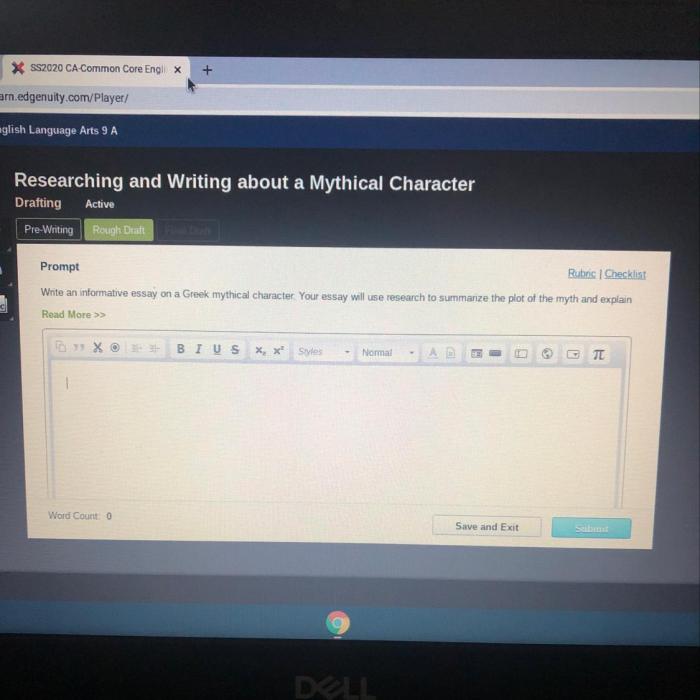
Greek mythical characters are archetypal figures who embody universal human experiences and values. They are central to Western culture, providing insights into our collective psyche and the human condition.
Greek mythology has had a profound impact on Western literature, art, and philosophy. Its stories have been retold and reinterpreted for centuries, inspiring countless works of art, literature, and music.
Importance of Analyzing Greek Mythical Characters
Analyzing Greek mythical characters provides valuable insights into:
- The nature of human nature and the human psyche
- The origins of cultural and religious beliefs
- The development of Western literature and art
Major Greek Mythical Characters: Essay On A Greek Mythical Character.
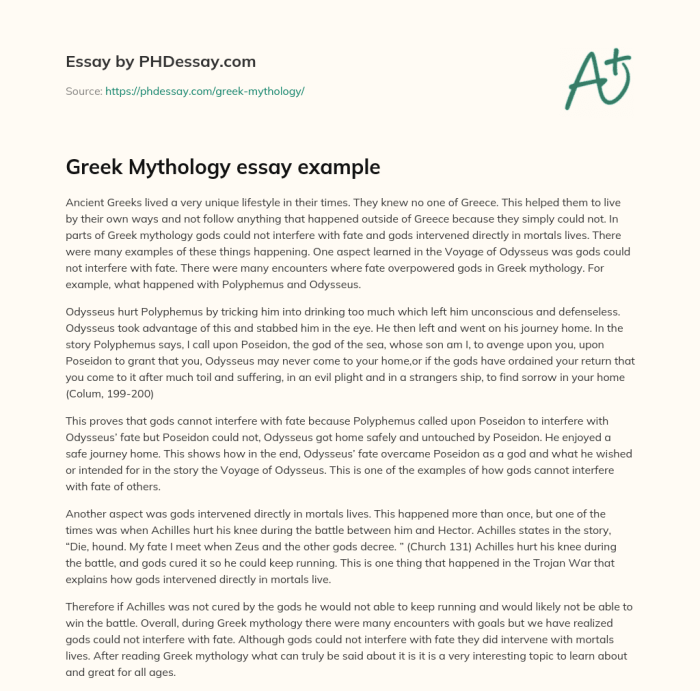
Greek mythology is a rich and complex tapestry of gods, goddesses, heroes, and monsters. These characters have played a significant role in shaping Western culture and continue to fascinate and inspire people today.
The following table provides a comprehensive list of some of the most important Greek mythical characters, along with their names, domains, and key attributes:
Table of Major Greek Mythical Characters, Essay on a greek mythical character.
| Name | Domain | Key Attributes |
|---|---|---|
| Zeus | King of the gods, ruler of Mount Olympus | Thunder and lightning, justice, order |
| Hera | Queen of the gods, goddess of marriage and childbirth | Jealousy, revenge, fertility |
| Poseidon | God of the sea, earthquakes, and storms | Trident, horses, water |
| Hades | God of the underworld | Wealth, death, darkness |
| Athena | Goddess of wisdom, war, and crafts | Owl, spear, shield |
| Ares | God of war | Violence, bloodshed, courage |
| Aphrodite | Goddess of beauty, love, and desire | Dove, rose, mirror |
| Apollo | God of music, poetry, prophecy, and healing | Lyre, bow and arrow, laurel wreath |
| Artemis | Goddess of the hunt, wilderness, and childbirth | Bow and arrow, deer, moon |
| Hermes | Messenger of the gods, god of travelers, thieves, and commerce | Winged sandals, caduceus, hat |
| Hephaestus | God of fire, metalworking, and volcanoes | Forge, hammer, anvil |
| Dionysus | God of wine, revelry, and theater | Grapes, ivy, thyrsus |
Symbolism and Archetypes
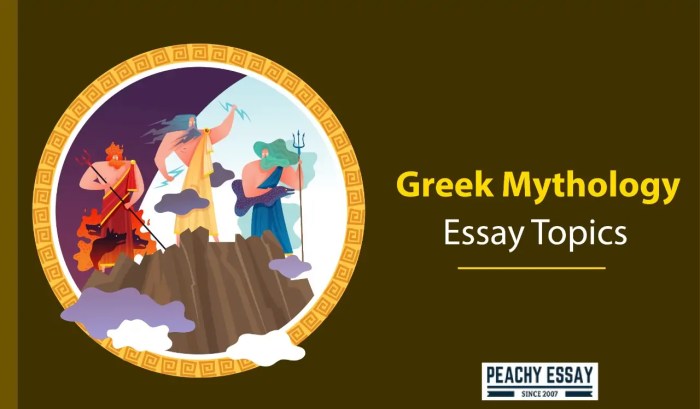
Greek mythical characters embody universal human experiences and emotions through their symbolic and archetypal representations. They reflect the collective unconscious and serve as archetypes that resonate with people across cultures and time.
Archetypal Patterns
Greek mythology features archetypal patterns that represent fundamental aspects of human nature. These include the hero, the trickster, the wise old man, the mother figure, and the villain. These archetypes embody the struggles, aspirations, and complexities of human existence.
Specific Characters and Symbolism
Specific Greek mythical characters embody distinct symbolic meanings:
- Zeus: King of the gods, represents power, authority, and the sky.
- Poseidon: God of the sea, symbolizes the unconscious, emotions, and the unknown.
- Hades: God of the underworld, represents death, the afterlife, and the hidden aspects of the psyche.
- Athena: Goddess of wisdom, war, and crafts, symbolizes intelligence, strategy, and feminine power.
- Prometheus: The trickster, symbolizes creativity, rebellion, and the dangers of hubris.
Narrative Structure
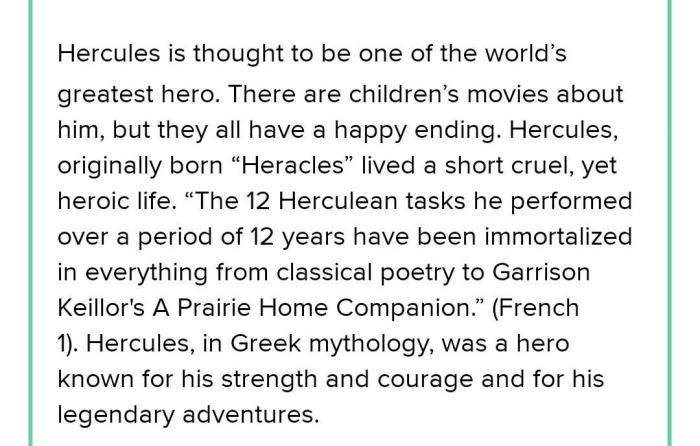
Greek myths featuring mythical characters exhibit a distinct narrative structure that contributes to their enduring appeal and cultural significance. These stories typically follow a recognizable pattern, incorporating common plot elements, themes, and character arcs that enhance their overall impact and resonate with audiences.
Plot Elements
Greek myths often begin with an inciting incident that sets the story in motion, such as a divine prophecy, a tragic event, or a conflict between gods or mortals. The plot progresses through a series of rising actions, where tensions escalate and complications arise.
A climax marks the turning point of the story, leading to a resolution that brings about a sense of closure or catharsis.
Themes
Greek myths explore universal themes that resonate with human experiences. These themes include love, loss, fate, heroism, and the nature of good and evil. By examining these timeless concepts through the lens of mythical characters, Greek myths provide insights into the human condition and the challenges we face.
Character Arcs
The characters in Greek myths often undergo significant transformations throughout the story. They may begin as flawed or arrogant but grow through trials and tribulations to achieve redemption or self-awareness. Alternatively, they may fall from grace due to pride or hubris, highlighting the consequences of unchecked ambition or moral transgressions.
Impact of Narrative Structure
The narrative structure of Greek myths plays a crucial role in their enduring impact. The recognizable pattern creates a sense of familiarity and anticipation, allowing audiences to connect with the characters and their journeys. The incorporation of common plot elements, themes, and character arcs provides a framework for exploring complex human emotions and experiences, making these stories both timeless and relatable.
Cultural Impact
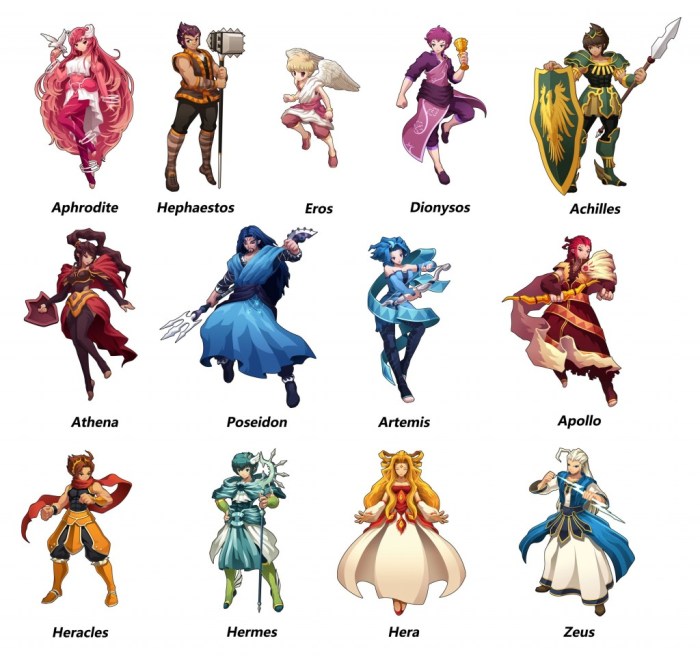
Greek mythical characters have had a profound cultural impact, shaping literature, art, and popular culture for centuries.
In literature, Greek myths have provided inspiration for countless works, from epic poems like Homer’s Iliadand Odysseyto modern novels and plays. Characters such as Odysseus, Achilles, and Helen of Troy have become archetypal figures, representing universal themes of heroism, courage, and love.
Art and Popular Culture
Greek mythical characters have also been a major influence on art. From ancient sculptures and paintings to Renaissance masterpieces, Greek myths have provided subjects for some of the most iconic works of art in history. In popular culture, Greek myths have been adapted into films, television shows, and video games, reaching a vast global audience.
One of the most striking examples of the cultural impact of Greek mythical characters is the way they have been reinterpreted and adapted over time. For instance, the character of Hercules has been depicted as a muscular hero in classical Greek art, a comedic figure in Roman plays, and a modern-day superhero in Marvel comics.
Modern Interpretations
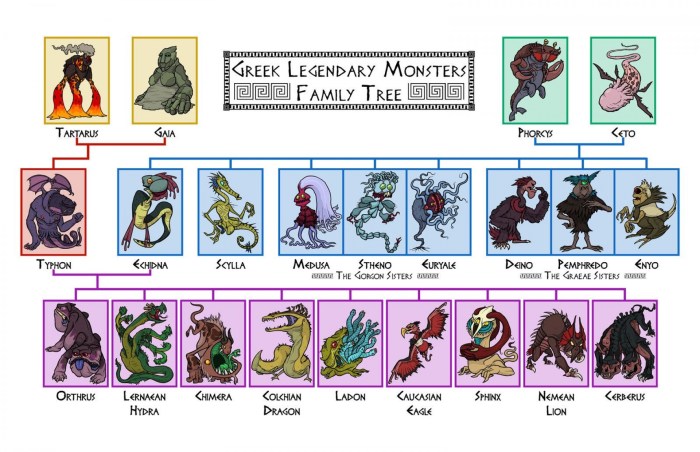
Contemporary interpretations of Greek mythical characters have witnessed a resurgence in modern literature, film, and other media. These reinterpretations reflect evolving societal values, cultural shifts, and the ongoing fascination with the timeless themes embedded in these ancient tales.
One notable trend is the reimagining of these characters to explore contemporary issues. For instance, in Margaret Atwood’s novel The Penelopiad, the story of Penelope, Odysseus’s wife, is retold from the perspective of the marginalized women in the tale, shedding light on themes of female agency and empowerment.
Reimagined Characters
- Persephone:In contemporary literature, Persephone’s abduction and return from the underworld is often interpreted as a metaphor for the cycle of life, death, and rebirth.
- Hades:Once portrayed as a fearsome ruler of the underworld, Hades has been reimagined in modern media as a complex and enigmatic figure, often depicted with a more sympathetic or even romantic side.
- Zeus:The king of the gods has been reinterpreted in contemporary works as a symbol of power, hubris, and the consequences of unchecked authority.
These reinterpretations serve to connect ancient myths with modern audiences, making them relatable and relevant to contemporary experiences and concerns.
FAQ Overview
What is the significance of Greek mythology in Western culture?
Greek mythology has played a pivotal role in shaping Western literature, art, philosophy, and religion. Its stories and characters have influenced countless works of art, from ancient Greek tragedies to modern-day novels and films.
How do Greek mythical characters represent universal human experiences and emotions?
Greek mythical characters often embody archetypal patterns and represent universal human experiences and emotions. For example, Zeus represents power and authority, while Aphrodite represents love and beauty.
What is the cultural impact of Greek mythical characters?
Greek mythical characters have had a profound cultural impact, influencing literature, art, and popular culture. They have been adapted and reinterpreted over time, continuing to inspire and resonate with audiences today.